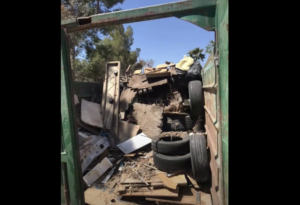By Kimmy Chacon, Jonathan Giovanazzi and Kali Raglin
Thousands of pounds of trash is piling up on Los Angeles street corners, freeway off-ramps, parking lots and alleyways — and an increasing number of residents have been calling the city to report it.
According to a recent report by L.A. City Controller Ron Galperin, reports from residents of illegal dumping have increased by 450 percent over the last four years.
Galperin, neighborhood activists and other government officials say many factors have led to the rise in trash: the region’s homelessness crisis, high fees at municipal waste dumps and overworked cleanup crews.
Also, on the region’s highways, “People throw [trash] out of car windows or sometimes things are not appropriately tied down and fly out of trucks,” said Godson Okereke, deputy director of maintenance for CalTrans District 7, which covers L.A. and Ventura counties.
Mayor Eric Garcetti wants to deploy teams where illegal dumping frequently happens.
But volunteers like Erin Fein and Jill Mather have also taken a role in cleaning up trash.
Mather, who leads an organization called Volunteers Cleaning Communities, remembered growing up in the restaurant business being taught never to walk over trash. This translated into her need to always pick up trash and when she retired, her goal became to “change the mindset of littering in America.”
“We have to change the culture,” Mather said. “Littering is going to make the world uninhabitable.”
To help address this issue, Mather dedicates time out of every day to clean trash. Her Chatsworth-based organization picks up trash 4-5 days a week, mostly holding their cleanups in the San Fernando Valley.
Fein founded the Echo Park Trash Club, whose members work with LA City Sanitation along with unhoused communities to clean up trash.
Fein began noticing more trash during the COVID-19 pandemic.
“I wanted to do something about it. I feel invested in the area I live in Echo Park,” Fein said. Fein used social media to start organizing the club’s trash pickups. The volunteers she organizes pick up 2 ½-4 tons of trash per clean-up,” Fein said.’
But even the volunteers concede that their efforts only make a dent in the broader problem.
“Once you clean an area up, give it a few days and you’ve got trash in that same area again,” Mather said. She has also noticed how when one person dumps in a spot, others will follow suit and also dump in the same location.
The problem is not just confined to the city of L.A. Forty-year LA County resident Tammie Necessary began the Trash Task Force, where she organizes local residents to help clean up illegal dump sites. She expresses her frustration with the increasing amounts of illegal dumping in Acton, a small town on the 14 Freeway between L.A. and Palmdale.
“There’s not much being done about it,” she said. “The Santa Clara River runs through here; all of this [trash] goes back into your water table.”

Photo courtesy of Tammie Necessary.
Okereke said CalTrans is aware of the risks roadside waste can pose to the environment.
“My interest in removing and eradicating trash is because I understand the consequences…it gets into the water system and it interrupts the ecosystem when we have materials that can’t degrade,” Orekeke said.
Necessary also believes officials should step up enforcement, impose stiffer fines, and give citizens easier ways to be able to report illegal dumpers.
Both Necessary and Mather believe part of the reason why illegal dumping is so prevalent in LA County is because fees to dispose of trash at dumps are so high. At minimum, Mather said one truck load costs $75 to dump.
Necessary said the private garbage company Waste Management offers some services such as free dump days and dump vouchers, but citizens are not aware of the programs.
L.A. is experiencing a homelessness crisis, and encampments do generate some of the waste on the streets.
But in the L.A. City Controller’s illegal dumping report, Galperin’s office concluded many people who are not homeless use encampments as illegal trash dumps, which increases health and safety risks to people living on the street.
South L.A. resident Guadaluipe Gonzalez said that in her neighborhood, unhoused residents are not major sources of trash.
“The same people that live in our house keep our streets dirty,” she said. “They litter in front of their house and in the alleyway. It’s the homeowners who litter.”
Fein actively engages unhoused individuals in helping to clean trash.
“We have a compassionate perspective with unhoused folks,” Fein said.
Okereke acknowledged an increase in homeless encampments along highways has led to an increase in trash.
However, Okereke said, “we should not blame trash only on the homeless. CalTrans is going as far as providing trash cans to encampments,” when it is safe to do so.
Okereke, Mather, Fein, and Necessary all said that people need to be more educated about the trash crisis.
“I don’t believe enforcement can solve the problem,” Okereke reflects, “We want to educate people.”
Mather’s group started a “Scavenger Litter Hunt” program where children learn about trash and help to clean it up to get the younger generation involved.
Fein also believes that people need to think critically about the issue since conditions and living situations contribute to more trash in the city. She says another option is to “create more room in the city budget for folks to be paid to clean” trash in the streets.
Mather also said many people remain unaware of programs meant to help residents dispose of trash legally. Mather pointed specifically to the 311 app, which will come and pick up trash along with programs to help reduce dump fees.
Mather believes that developing a sense of “pride in community” can help solve the trash problem.
“The community has to realize they have to get involved in their own community,” she said.
Mather feels that residents need to have the mindset that they’re “part of the community. The city can’t do it all for me. I want to make it beautiful … and I’ve got to do my part.”

 Tweet this Video
Tweet this Video Share on Facebook
Share on Facebook Share via E-mail
Share via E-mail

